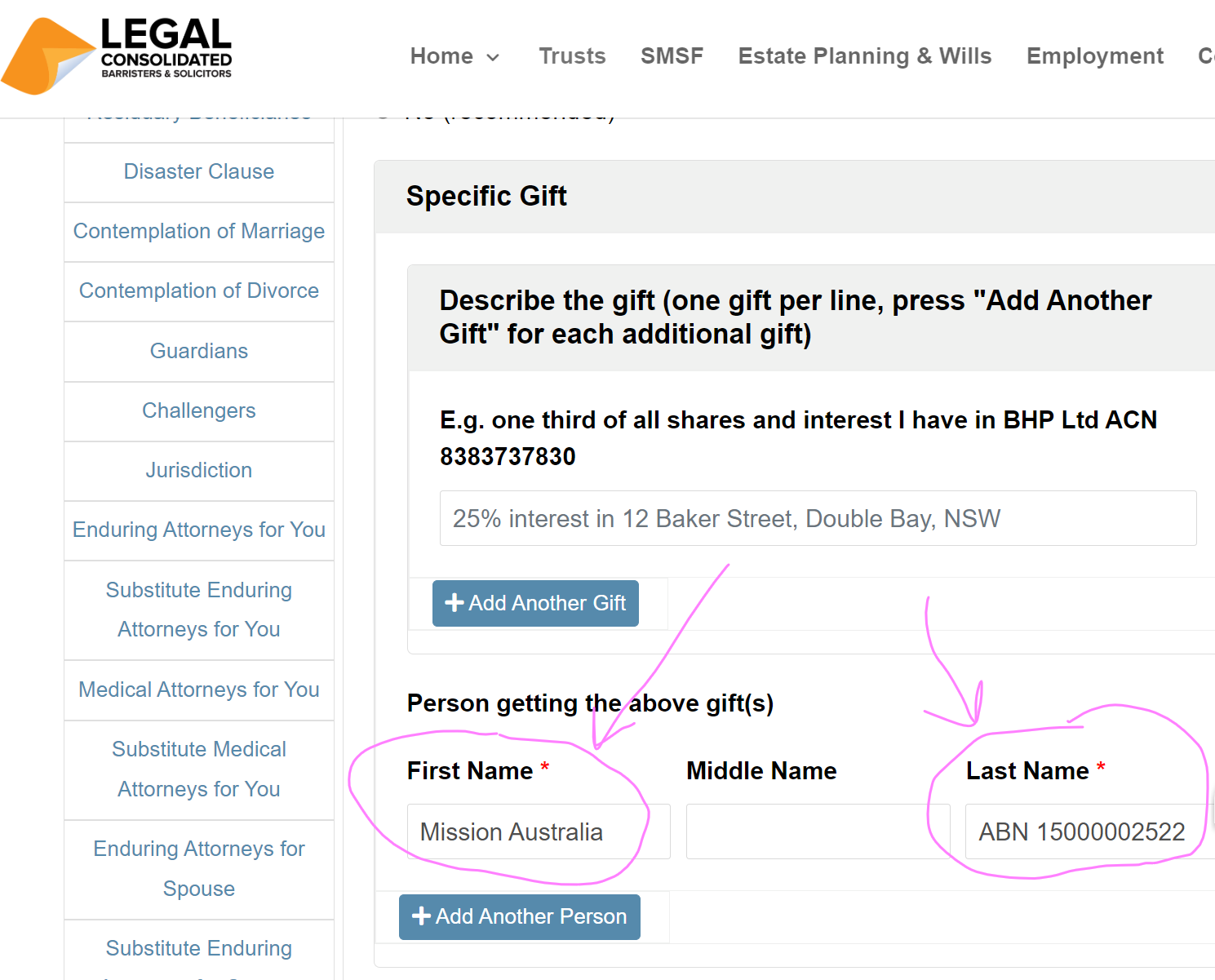Are funeral wishes in a Will legally binding?
The funeral wishes in your Will are not legally binding. Your executor is not required to follow them. Do not clutter your Will with directions for your funeral and remains.
Your Will has to take a journey. It goes to the Supreme Court Probate office for your Will to be proved. It then goes to the land titles office to transfer your real estate. Your Will is then a public document at which time the ATO is at liberty to squeeze any tax it can out of your Will.
Do not put extraneous information in your Will. It just adds complexity to your Will. A Will just gives away what you own. Do not try and make it do things for which it is not designed. For example, do not try and put a Loan Agreement in your Will.
Rather, speak to your executors and loved ones and let them know if you want to be buried, cremated or something else.
Can I write a letter for my funeral and body remains?
Want to put something in writing? That is fine. Just write your wishes for your funeral and remains in a Funeral Wish List. (If you have specific gifts they then are also best not to put in your Will. Here is a free Gift Wish List.)
Expressing your funeral wishes is thoughtful. It eases the stress on your family in making decisions on the type of funeral you want.
How to store a Funeral Wish List
This is how to protect and keep your Funeral Wish List:
- Do not sign the Funeral Wish List. Merely write your name at the end of it.
- Scan it and email it to your family members and executors.
- Put the Funeral Wish List in an envelope.
- Keep the envelope with your Will.
Free Funeral Wish List
Your sample letter for your executor on your funeral and what you want to be done with your body:
- The use of your body for medical purposes (eg organ donation or research and education). But make sure you have also completed all the government requirements as well.
- Funeral. Want to be buried or burnt? Do you have a location?
- Do you have a preferred funeral director?
- Have you pre-paid your funeral or burial plot? Or have you purchased bonds from the funeral director?
- Do you want a lavish funeral? Most Will makers want expenses kept to a minimum. But some funeral directors often ‘upsell’ to the grieving loved ones.
- Do you want a religious service? Is there a particular faith? Many aesthetics and agnostics scamper back to their religious affiliations when death looms.
- ‘In Memoriam’ gifts to charities or groups, rather than flowers?
- Directions such as music?
Free Sample of Funeral Wishes letter template
[Your Full Name]
[Your Address]
[City, State, Postcode]
Australia[Email Address]
[Phone Number]
[Date]
To my Executors and Family,
Funeral Wishes
I trust this letter finds you well. As you are aware, you have been named as the executor of my estate. This role comes with the responsibility to manage not only my assets but also the specific details concerning my funeral and the disposition of my body after my death. This letter aims to assist you in fulfilling these duties in alignment with my final wishes as to my body and funeral.
1. Medical Use of My Body
I have elected to donate my organs to those in need and to offer the remainder of my body to the scientific community for research and education. This decision is documented with all required government consents already in place, ensuring legal compliance. Please liaise with the appropriate medical institutions to facilitate this process as swiftly as possible following my death.
2. Funeral Arrangements
- Method of Body Disposal: My preference strongly lies with [cremation/burial]. If cremation is chosen, please arrange for my ashes to be [scattered at/inurned in a specific location], which holds personal significance to me. For burial, secure a plot at [Name of Cemetery], located at [Address/Location], where a space has been pre-purchased.
- Funeral Director: To oversee these arrangements, I have appointed [Name of Funeral Director] from [Funeral Home Name], located in [Location]. They are fully briefed on my preferences and have previously handled similar requests with dignity and professionalism.
- Financial Arrangements: I have ensured that the necessary financial arrangements are in place, including [pre-paid funeral plan/burial plot purchase/funeral bonds], to cover all expected costs. Documentation concerning these arrangements is stored [specify location], and I urge you to review these to avoid any financial strain or confusion.
- Funeral Service: My wish is for a service that reflects my life rather than my death. I prefer a [simple/lavish] gathering, but stress the importance of avoiding any unnecessary expenses. Please be vigilant and question any costs that seem excessive or not in line with a dignified, respectful farewell.
3. Religious Service
I have chosen [to have/not to have] a religious service. [If applicable, include details about any specific faith traditions, texts, and rituals you would like incorporated into the service, reflecting personal beliefs or cultural heritage.]
4. ‘In Memoriam’ Gifts
In lieu of flowers, please direct mourners to consider making a donation to [Name of Charity or Organisation], an entity I have supported throughout my life. Contact details for the organisation are [Contact Details], and I believe contributions to this cause will honour my memory fittingly.
5. Funeral Aesthetics
- Music and Readings: The service should include [list specific songs, musical pieces, or literary readings]. These selections resonate with my personal journey and express my philosophical outlook.
- Additional Requests: Further, I would appreciate it if [specific attire, e.g., bright colours, is worn/photographs of my life are displayed/a video montage is played]. These elements are intended to celebrate life and share memories rather than solely mourn my death.
I am relying on you to ensure that these instructions are carried out with respect and fidelity. Should there be any uncertainty or need for decision-making in areas not covered by this letter, please consult with my legal advisors at Legal Consolidated Barristers & Solicitors. They are well acquainted with my values and will provide guidance in line with my overall intentions.
Thank you for agreeing to undertake this crucial role. I am confident in your ability to manage these matters with the care and attention they deserve.
Yours sincerely,
[Your Printed Name – do not sign. Only print your name.]
(Here is a free Specific Gift Wish List)
Funeral wishes are not binding in a Will or Wish List
Whether they are in the Will (incorrect) or in a letter (better option) funeral wishes are never legally binding on your executor or family. They merely express your preferences.
Funeral wishes, whether they are stated in a Will or a Wish List, are not legally binding in Australia. They may express your wishes as to how you would like your funeral to be conducted. However, the final decision rests with your executor and family. It is important to communicate your wishes clearly. However, understand that they might be subject to practical considerations and the circumstances at the time of your death.
Your executor is expected to talk with family members regarding this, however, they are not legally bound to do so.
Pre-paying my funeral to try and override my executors in my Will?
Talk with your financial planner and accountant about pre-paying your funeral and investing in funeral bonds.
If you are keen to ensure your funeral arrangements are followed exactly as you wish, consider pre-paying your funeral. This approach not only secures your plans but also provides a clear directive to your executor. Pre-payment is both a financial incentive and encouraging adherence to your funeral wishes.
Also, this strategy is beneficial for Centrelink purposes. By entering into a contract that shows you have paid in full for your funeral, you reduce your Centrelink assessable assets.
For the Centrelink assets test, the amount that you prepay to a funeral director or invest in a funeral bond specifically for the funeral director are excluded from your assets. This helps you align both your personal wishes and your financial interests.
Who owns my dead body when I have a Will?
The legal authority to make decisions about your dead body, such as arranging for burial or cremation, typically rests with the executors named in your Will.
Who owns the dead body when there is no Will?
Britt v Office of the State Coroner [2022] WASCA 75
- The son dies. The defacto wants his body. His mother wants his body.
- The body is released to his de facto partner. Mum objects.
The mother seeks an order for the release of her dead son’s body. The body is in Western Australia. But she wants to bury her boy in South Australia.
But the dead boy’s de facto wants to cremate the boy in Western Australia.
Mum argues that the boy did not live that much with the de facto. But that is an unfair statement. The court finds that despite periods of incarceration, the dead boy worked as a fly-in-fly-out worker. Therefore, there were periods when he did not reside with his partner. This does not represent a “permanent rupture” of the relationship.
Further, there:
- is evidence of continuity until the boy dies; and
- is no reason to depart from the general principle of releasing the body to the person who was most likely to be granted administration of the deceased’s estate. In this instance, it is the de facto partner. (You seek ‘Administration’ if there is no Will.)
In contrast, if you have a Will then the Executor decides what to do with your mortal remains. Another reason everyone – young and old – should have a Will.
Who ‘owns’ my body when I am dead?
Under Australian law, your corpse is not personal property. It cannot be ‘owned’. Rather, your executors in your Will are granted a right of possession for the limited purpose of burial, cremation or some other form of disposal. Therefore, technically no one “owns” a person’s body; rather, the executor of the deceased’s Will has the discretion to determine how the body is dealt with.
This right of possession by the executor includes making decisions about the funeral, burial, or cremation, by any wishes you may have expressed either verbally during your lifetime or on a Wish List (never in the Will).
If there is no Will, then the next of kin typically assumes responsibility for making these decisions. This often includes your spouse, adult children, or parents. Legal disputes arise when there are conflicting views among family members or between family members and the designated executor about the appropriate course of action.
You need to communicate your preferences for after-death arrangements clearly and, ideally, document these preferences in a Wish List. This helps to minimise misunderstandings and conflict among surviving relatives and ensures that the deceased’s final wishes are respected as closely as possible. Do not contaminate the Will with your wishes.
When I am dead how do I tell my family about my Implantable Cardioverter-Defibrillator and pacemaker?
Q: My client suffered a heart attack and now has an Implantable Cardioverter-Defibrillator (ICD) inserted. His doctors have advised him to update his Will. This is to ensure that at death his implant is either removed or turned off. The implant continues to try and kick-start him even though he is permanently dead.
A: How fascinating. However, for the same reason you do not put funeral arrangements in your Will, you also do not put in things for the Executors to do regarding pacemakers. The job of your Will is to give away what you own. It is not there to document loans, set out burial rights, explain in which part of the back lawn you buried the gold bars or disconnect your life support, such as a pacemaker.
And besides, you are burnt or buried well before anyone gets around to looking at your Will. If you want to express some of the above prepare an unsigned “Wish List“. And keep it with your Will. But the better course of action is to:
- tell your Executors and loved ones about these sorts of issues
- keep notes of these issues with your Medical/Lifestyle POA
Your Will is a fighting document. It fights to reduce death duties. The divorce protection trusts stop money from being lost in the beneficiaries’ divorce courts. It has bankruptcy trusts. Do not contaminate this fighting machine with the above issues.
There is an example of a Wish List here.
Can the executor stop people from attending my funeral?
The role of an executor in managing the affairs of a deceased person is critical and multifaceted, encompassing legal, financial, and personal responsibilities. One aspect that often raises questions is the executor’s authority regarding funeral arrangements and attendance.
The death of an individual not only brings grief but also a set of procedural responsibilities that often fall to the executor named in the deceased’s Will. Among these responsibilities is the arrangement of the funeral—a process that, by its nature, can become emotionally charged and potentially contentious. A common question that arises is whether an executor has the authority to limit attendance at the funeral or burial of the deceased.
Under Australian law, while a corpse cannot be owned and thus does not constitute property, the executor appointed in the Will is given the right of possession for the specific purpose of arranging a proper burial or cremation. This role, however, comes with limits. The executor’s authority is intended to facilitate the handling of the deceased’s remains in a manner that respects the wishes of the deceased (where known) and the law.
Executor’s Authority over Funeral Arrangements
The executor’s control over funeral arrangements includes decisions about the location, nature of the funeral or memorial service, and the handling of the body (burial vs cremation). However, these decisions must align with any instructions left by the deceased and the reasonable expectations of the family and community.
Limits on excluding Individuals from Funeral Attendance
Despite the broad authority over the arrangements, the executor does not have carte blanche to exclude people from attending the funeral. Legal and ethical constraints are designed to prevent such exclusions if they are deemed unreasonable or if they contravene the wishes of the deceased. Attendees who wish to pay their respects in a manner that is reasonable and respectful—such as placing flowers on the grave—cannot typically be barred by the executor.
Fighting over where my ashes are scattered
When you die, the question of where to scatter ashes may become controversial among your family. Under the law, unlike a body before cremation, ashes are considered property. In most states of Australia, the person who is recognised as the owner of the ashes is typically the person who secured the cremation permit, often the executor.
The executor has considerable discretion in handling the ashes, and other parties involved usually can only express their views to the executor. From our research, there has been no Supreme Court where an injunction was issued to stop an executor from scattering ashes in a specific way. The court has indicated its support for the executor’s decisions, particularly if they align with the deceased’s expressed desires.
In New South Wales, the relevant legislation includes the Cremation Act 1961. This Act regulates the process of cremation and provides guidelines on how the ashes should be handled, though it primarily focuses on the operational aspects of cremation rather than the post-cremation handling of ashes.
Sharing the ashes
Your ashes do not necessarily have to be kept together. To mitigate disputes among family members, one effective strategy is to share the ashes. The executor, who legally holds the right to the ashes, can divide them into several urns, allowing each recipient to decide what they wish to do with their share.
Managing your remains can often lead to unexpected conflicts. In Australia, the law generally backs the decisions of the executor, underscoring the importance of choosing executors for your Will who are not only competent in handling your estate but are also trustworthy and respectful of your final wishes.
Can the executor donate my organs?
The power to donate organs after death generally requires explicit registration by you as an organ donor. This is before you die. If you are not officially registered as an organ donor, the executor or family members cannot make organ donation decisions on your behalf.
Organ donation is a vital public health issue, with significant implications for the healthcare system in Australia. The role of an executor in managing the deceased’s estate includes ensuring that the deceased’s personal and healthcare wishes are respected.
In Australia, the decision to donate organs after death is generally governed by explicit registration by the individual before death. This registration is legally binding and guides the actions of healthcare providers and executors after death.
Can the executor consent to organ donation if the dead person has not registered as a donor?
If you die without having registered as an organ donor, your executor does not have the right to authorise organ donation on your behalf. In Australia, organ donation consent is governed by your registration on the Australian Organ Donor Register. The executor must obtain a court order to proceed with the donation.
This is not possible without a court order.
Protects from death duties, divorcing and bankrupt children and a 32% tax on super. Build online with free lifetime updates:
Couples Bundle
includes 3-Generation Testamentary Trust Wills and 4 POAs
Singles Bundle
includes 3-Generation Testamentary Trust Will and 2 POAs
Death Taxes
- Australia’s four death duties
- 32% tax on superannuation to children
- Selling a dead person’s home tax-free
- HECs debt at death
- CGT on dead wife’s wedding ring
- Extra tax on Charities
Vulnerable children and spend-thrifts
- Your Will includes:
- Divorce Protection Trust if children divorce
- Bankruptcy Trusts
- Special Disability Trust (free vulnerable children in Wills Training Video)

- Guardians for under 18-year-old children
- Considered person clause to stop Will challenges
Second Marriages & Challenging Will
- Contractual Will Agreement for second marriages
- Wills for blended families
- Do Marriages and Divorce revoke my Will?
- Can my lover challenge my Will?
- Make my Will fair: hotchpot clauses v Equalisation?
What if I:
- have assets or beneficiaries overseas?

- lack mental capacity to sign my Will?
- sign my Will in hospital or isolating?
- lose my Will or my home burns down?
- have addresses changed in my Will?
- have nicknames and alias names?
- want free storage of my Wills and POAs?
- put Specific Gifts in Wills
- build my parent’s Wills?
- leave money to my pets?
- want my adviser or accountant to build the Will for me?
Assets not in your Will
- Joint tenancy assets and the family home
- Loans to children, parents or company
- Gifts and forgiving a debt before you die
- Who controls my Company at death?
- Family Trusts:
- Changing control with Backup Appointors
- losing Centrelink and winding up Family Trust
- Does my Family Trust go in my Will?
Power of Attorney
 Money POAs: NSW, VIC, QLD, WA, SA, TAS, ACT & NT
Money POAs: NSW, VIC, QLD, WA, SA, TAS, ACT & NT
- be used to steal my money?
- act as trustee of my trust?
- change my Superannuation binding nomination?
- be witnessed by my financial planner witness?
- be signed if I lack mental capacity?
- Medical, Lifestyle, Guardianships, and Care Directives:
- Company POA when directors go missing, insane or die
After death
- Free Wish List to be kept with your Will
- Burial arrangements
- How to amend a Testamentary Trust after you die
- What happens to mortgages when I die?
- Family Court looks at dead Dad’s Will

